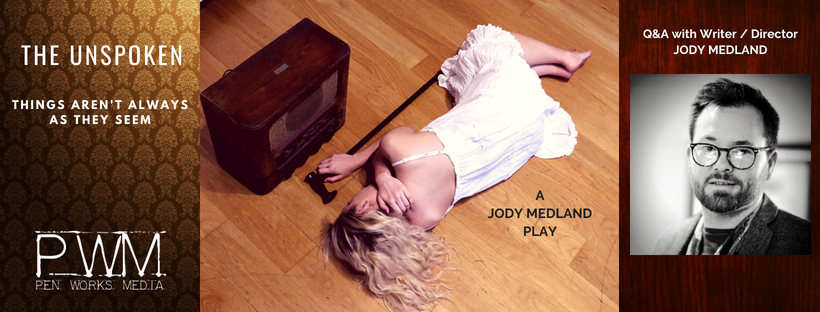How did The Unspoken come about?
The first draft was written back in 2003. I was experimenting with the playbook format as I’d never written a play before. At the time, I was also curious about how disgraceful a character’s actions had to be before the audience would refuse to forgive them, so I was testing a few emotional boundaries. I never looked at the script again until last year, when Actor Awareness set “class” as a theme for their writing submissions. Finally, I felt I had enough substance and direction to finish the piece.
So your starting point was creating a character who provoked a major reaction?
I’m obsessed with characters and their motivations, and I’ve worked hard over the years to understand what makes audiences love and hate characters, as well as what actions they find admirable, acceptable, and unforgiveable. I pride myself in the strength and depth of my characters, and I think that’s what people are enjoying about The Unspoken.
Is it true that you consciously refused to invite any reviewers to your previews?
Yes, for a number of reasons. Mainly, I knew the play wasn’t completely ready and that I wanted to add another 10-minutes or so to the script. And honestly, I wasn’t convinced an audience would appreciate this play. I was fully prepared to walk away from the theatre feeling the audience just hadn’t connected to it, so I attended both previews solely to monitor the audience’s reaction.
How did you feel when people went crazy for it?
I was over the moon. The audiences were made up of people I thought would like it, people I thought wouldn’t like it, and complete strangers – so to unanimously get such glowing feedback was a little unexpected. Huge credit has to go to the cast, who performed exceptionally, but the feedback confirmed to me that there is an appetite for this type of story.
When you’re describing the play, how do you sum it up?
The simplest way is to say it’s a black comedy / drama, but the truth is, there’s a whole other element working away in the background. There’s some genuine satire in there, but by the time the viewers realise it, most of them have been moved to tears already, so it often leads them to think, ‘What the hell am I watching here?’ But by all accounts, the genre-bending is one of the things the audience loves most about it.
Who are your main literary inspirations?
They’re countless, really. But since we’re talking about plays, David Mamet, Harold Pinter, Martin McDonagh and Arthur Miller are all exceptional playwrights who I’ve always looked up to.
So how does it make you feel to hear people comparing The Unspoken to Pinter?
It’s hugely satisfying that my work would make somebody think of him. Given my love for that style of storytelling though, perhaps it’s not a huge surprise. Perhaps an even bigger compliment was on the night of the first preview when someone said it reminded them of Arthur Miller, because people can label anything that’s a little “out there” as Pinter, but you’d only compare something to Miller if you’ve really bought into the depth of the characters. So that was perhaps more satisfying to me.
Why should people come and watch this play?
Most of the stuff I’m seeing on the fringe is either about dating or problems between angsty teenagers, so this certainly offers something different to that. It has an intelligence that keeps you thinking about it after you leave the theatre, and the cast is made up of really strong, interesting actors. So all-in-all, it makes for a great night out.
We’d like to thank Jody for taking the time to speak to us, and can’t wait for The Unspoken to begin its 2-week run at the Barons Court Theatre. There are 14 performances between 10th – 22nd September, and you can book your ticket from the link below.

